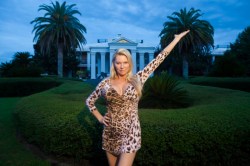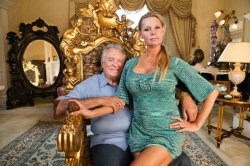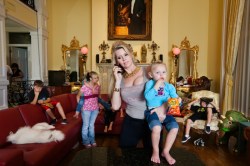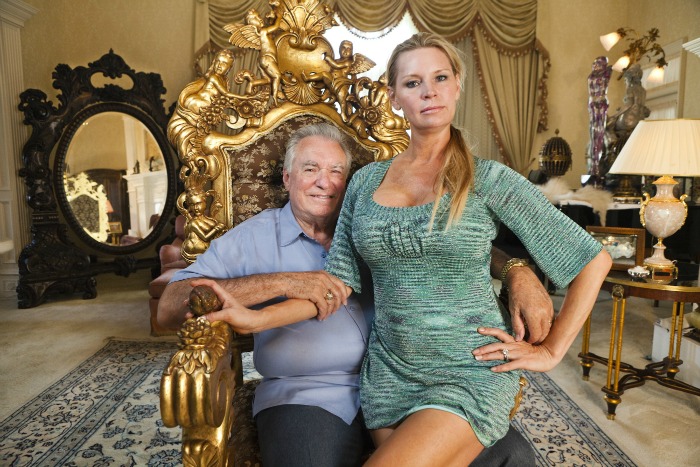
Jackie Siegel in front of her family’s 26,000-square-foot home. (Photo courtesy of Lauren Greenfield/Magnolia Pictures.)
In 2007, Jackie and David Siegel were “bursting out of the seams” of their old house. At 26,000 square feet, it felt too cozy for their eight-kid family and their extravagant lifestyle. They were ready to upgrade. So they started building their dream home: a 90,000-square-foot behemoth, inspired by the palace of Versailles, that would include 30 bathrooms, 10 kitchens, two tennis courts, a bowling alley, a skating rink, a sushi bar, and $5 million worth of marble — you know, the essentials. The Florida mansion would be the biggest house in the United States.
Around the same time, photographer Lauren Greenfield met Jackie Siegel at a party for Donatella Versace while Greenfield was working on a project about wealth and consumerism. An interest in photographing the Siegels turned into an idea for a documentary that would chronicle the construction of their new home. “I was interested in the connection between the American dream and home ownership — the way the home had become not just a place to live and raise your family, but a designed expression of identity and success,” Greenfield explains.
The Siegels’ story represented this phenomenon at its most extreme, a supersized version of the same vision chased by Americans of all income levels.
In the middle of 2010 — about a year into filming the documentary — the financial crisis finally caught up to the Siegels, and Greenfield’s film took a fateful turn.

David and Jackie. (Photo courtesy of Lauren Greenfield/Magnolia Pictures.)
David Siegel’s time-share business, Westgate Resorts, which he described as the largest time-share corporation in the world, was forced to lay off thousands of employees. The still-incomplete dream home had to be put on the market, and construction stalled on Westgate’s newest luxury property in Las Vegas. The kids were pulled from the private schools and enrolled in public ones, and Jackie began shopping at Walmart. What started as an inside look at wealth became, as Greenfield put it, “an allegory about the overreaching of America.”
The resulting film, The Queen of Versailles, has been screening across the country to rave reviews. What makes the film compelling, and elevates it above the two-dimensional rich-bashing screed it could have been, is Greenfield’s humanizing portrayal of the Siegels. She avoids the easy temptation to mock or condemn them, instead letting honest interviews and intimate footage speak for themselves: the family limo waiting in a McDonald’s parking lot; Jackie showing off the stuffed corpse of a beloved dog; Jackie baffling a car-rental employee at the airport by assuming the car comes with a driver. As Jackie lectures one kid for neglecting a pet lizard and letting it die, another kid pipes up, “I didn’t even know we had a lizard!”
But we also learn that Jackie came from humble roots and worked hard, at one point earning $3.35 an hour working in a morgue; she was an engineer for IBM before trading that career for modeling and beauty contests. She met David, 31 years her senior, after being crowned 1993’s Mrs. Florida. She is his third wife; her oldest daughter says thoughtfully that “I think my mom was kind of a trophy wife for my dad.”
Even David — though he lets slip that he “personally got George W. Bush elected president” by means that “may not necessarily have been legal” — doesn’t come across as 100 percent evil corporate villain, nor was he born with silver spoon in mouth.

Photo courtesy of Lauren Greenfield/Magnolia Pictures.
“There’s something about both their virtues and their flaws that invites us to take a look at our own,” Greenfield said. “In a way they represent the best and worst of us. They’re hardworking, self-made people; they’re not entitled. But they went too far; they didn’t know where to stop.”
This implication — that all of us secretly, or subconsciously, covet the same excesses as the Siegels, and that this underlying greed drives our society — makes it hard to watch Queen of Versailles with nothing but blithe schadenfreude. “Everyone wants to be rich,” David says at one point in the film. “If they can’t be rich, the next best thing is to feel rich. If they don’t want to feel rich, they must be dead.”
You disagree? Before the downturn, David was doing pretty good business on this premise: Westgate pushed time shares to sometimes-under-qualified folks by selling them on the idea that everyone deserves a vacation, and if you can’t have your very own luxurious getaway, the next best thing is to share one.
The story of the Siegels’ life and their business becomes a fascinating parable about this cultural narrative that says material indulgence is the ultimate reward we’re all toiling for — more satisfying than our relationships, our community, or our intellectual or emotional fulfillment. It’s easy to convince people to buy time shares or cars or homes they can’t really afford when decadence is symbolically equivalent to real achievement.
“David was in the interesting position of being on both ends of the banking equation,” Greenfield says. “He was selling mortgages to people biting off more than they can chew in their dream to have a little bit of this aspirational luxury, and then he was also getting bankrolled for his own dreams, which he ultimately could not afford.”
But does this mean that, as Greenfield says, “everybody is responsible” to some degree for the economic mess we find ourselves in? That the Siegels deserve our sympathy because they, too, had to scale down their desires?
Maybe, but let’s not forget that while many people were living beyond their means before the crash, some played bigger roles than others in bursting the bubble — and creating it in the first place. David is not a callous Wall Street overlord who deserves to rot in prison, but he, too, was playing a risky game, gambling with people’s fortunes. Like the big bankers, he should have seen that his business was precarious. Instead, he continued to profit by taking advantage of his customers’ aspirations, basking in luxury at the expense of many people’s futures — his clients’, those of the employees he laid off, and ultimately, his own family’s.
If our values have changed since the financial crisis, Greenfield isn’t convinced that it’s permanent. The Occupy movement lifted the taboo on hating the rich, unleashing a force of popular anger that converted much of our envy into disgust. But there’s something about Queen of Versailles that feels different — too close to comfortably loathe these people.
The film is a welcome salve in a country polarized by accusations of class warfare. But just because we can see people like the Siegels as human doesn’t mean we shouldn’t hold them accountable. We can’t let our sympathy overshadow the need to protect those of us with more humble dreams than the Queen of Versailles.




